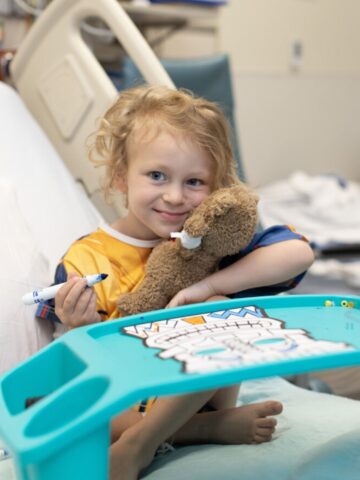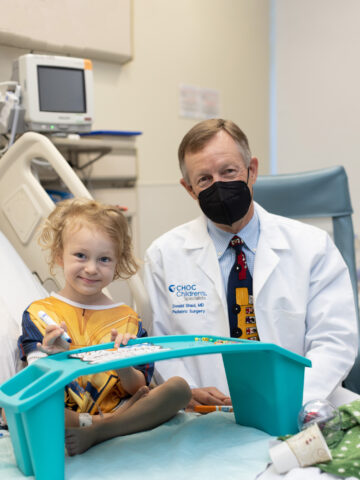Colorectal problems are fairly common among newborns and young children. Still, early detection — coupled with the right surgeries and medications — can have a long-lasting positive impact, according to Dr. Donald Shaul, a pediatric surgeon at CHOC’s Pediatric Colorectal Program.
During a recent talk, Dr. Shaul noted that, along with treatment, teaching children good practices — such as striving for regular bowel movements — can foster good health and reduce stress for them and their families.
Dr. Shaul was joined by Dr. Ashish Chogle, a pediatric gastroenterologist, who helped co-found CHOC’s Pediatric Colorectal Program.

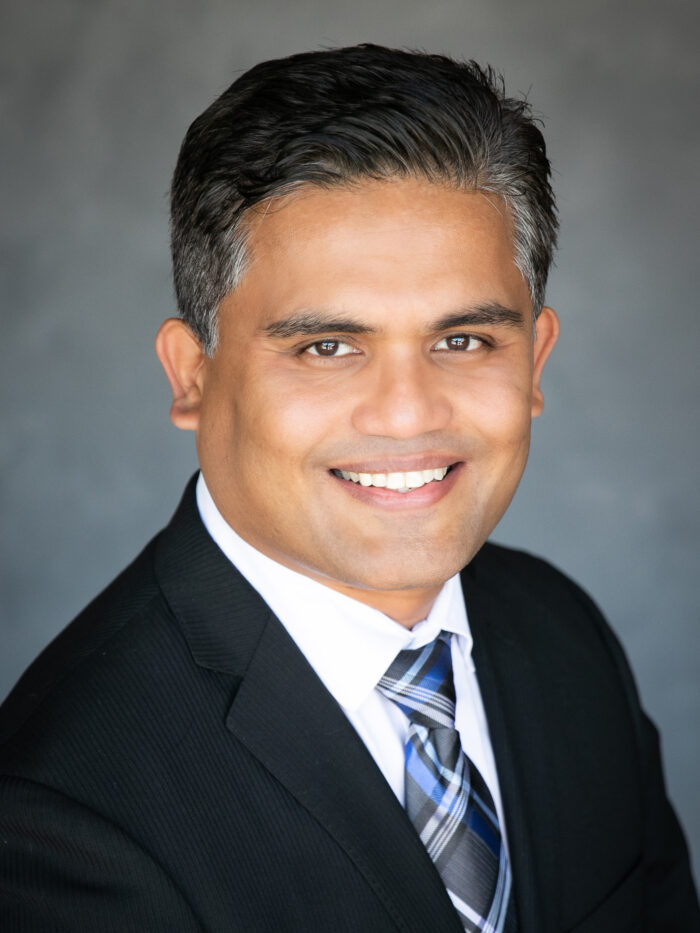
“Having a normal bowel movement every day is an important thing for normal adults and children,” says Dr. Shaul. “And you can imagine that if these children can’t have normal bowel movements, or have fecal incontinence, it has a tremendous impact on their quality of life. So, for our Pediatric Colorectal Program to treat these children, offers the family a tremendous sigh of relief. We make these families so happy when we get this sorted out for them.”
Problems with the colon and rectum can vary greatly, which is a challenge for doctors new to the field. Shaul outlined four goals for this talk that would help newer doctors gain a better understanding of these various issues:
- Become familiar with anorectal malformations and Hirschsprung disease.
- Review post-surgical and functional complications in children with anorectal malformations and Hirschsprung disease.
- Know the workup in children with anorectal malformations and Hirschsprung disease who have complications after their initial surgeries.
- Know about the treatment approach for constipation and, fecal incontinence in these patients.
Hirschsprung Disease and anorectal malformations
Hirschsprung disease is the absence of intrinsic ganglion cells in the bowel wall (specifically the submucosal and myenteric plexuses). Anorectal malformations are abnormal development of the cloacal region during the fourth to 12th week of gestation.
Symptoms of Hirschsprung disease include intractable constipation, abnormal distention and bilious vomiting, among others. Evaluating the condition includes rectal biopsy, anorectal manometry and contrast enemas.
Impact of colorectal conditions on pediatric patients
These kinds of colorectal problems can have a drastic impact on a child’s quality of life and cause changes not only in their physical well-being but also in their emotional state.
Dr. Shaul has been teaching surgical fellows now for close to 30 years. Because there are so many variations in these different forms of anomalies, it’s hard for a young surgeon to master all of them, Dr. Shaul explains.
“That’s why I’m here at CHOC. To teach these young surgeons how to do these operations perfectly,” he says.
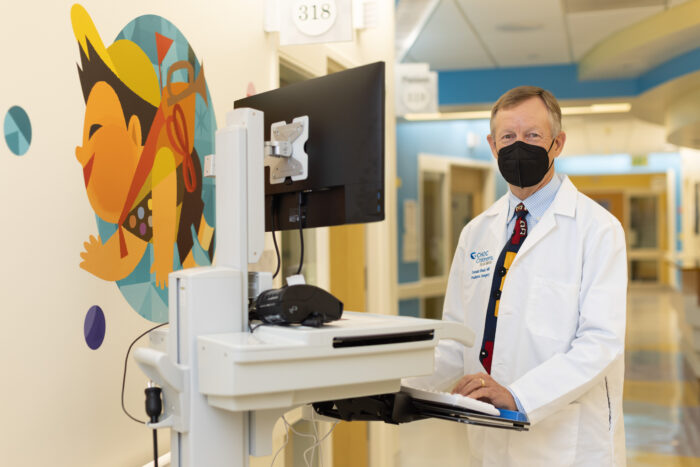
Young children can worsen the problem with their behavior, such as avoiding bowel movements. Dr. Shaul uses a metaphor of a water bucket to teach them the importance of being regular. He tells parents and children to imagine a bucket under a faucet with the water running. What happens when the bucket becomes full?
“Children will say, ‘turn off the faucet.’ And I’ll say, ‘No, you can’t turn it off. That means you stop eating. So, what you have to do is dump the bucket out and put it back under the faucet.’ They get that.” Some of the patients require treatments and even secondary surgeries later in childhood to help the children and their families learn how to efficiently “empty their buckets”.
Treatment plan for patients with colorectal issues
During his portion of the talk, Dr. Chogle discussed the importance of the team of specialists who work with children with colorectal disorders, including Hirschsprung disease and severe constipation.
“We assist the surgeons in managing these patients, says Dr. Chogle, who started CHOC’s Pediatric Colorectal Program. “They all require specialized care and close collaboration between the pediatric colorectal surgeon, the pediatric gastroenterologists, pediatric urologists and gynecologists. And the care coordination is facilitated by our special pediatric nurse coordinators.”
Dr. Chogle talked about his work in establishing a plan of action for treating these patients.
The role of a pediatric gastroenterologist, especially one with expertise in GI motility, is to help understand the patient’s anal and colonic function or dysfunction, and then use that knowledge to guide subsequent treatments with medications and surgeries.
The act of stooling is a complicated process that involves a series of muscular contractions that can be influenced by things as simple as the height of the knees while sitting on a toilet. It’s a very involved mechanism of stooling, which people often take for granted — a lot of things can go wrong with it, says Dr. Chogle.
Colonic motility
Various tests are available to check colonic motility, including Sitz markers, colonic scintigraphy, wireless capsules and colonic manometry. The Sitz test, which involves patients swallowing a capsule containing several radiopaque rings that can be tracked, is relatively inexpensive and can provide a rough assessment of colonic activity. Scintigraphy works in a similar way.
Wireless capsules provide more information, including temperature and pressure in the gut, but they are large. It can be difficult for younger kids to swallow the capsules, so this test is not used as frequently for children.
Colonic manometry is only done at a few children’s hospitals. Dr. Chogle calls it a “very elegant and important tool.” But it takes longer and is a more invasive procedure than the others.
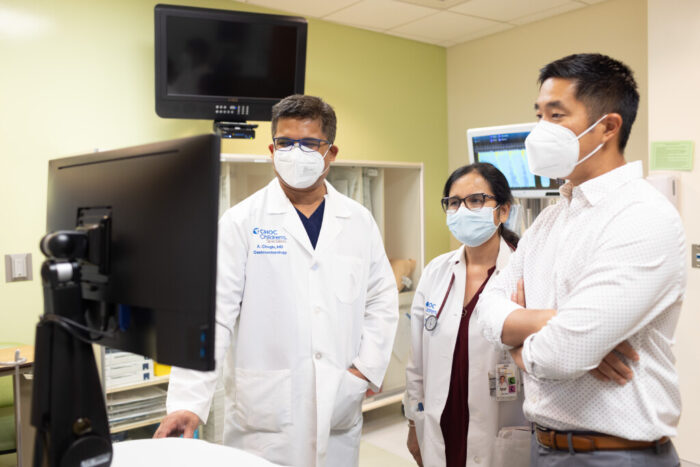
Another test is anorectal manometry, which is a preferred test for those with anorectal malformation or Hirschsprung disease. It involves using a catheter with sensors and an attached balloon.
With this test, Dr. Chogle and team can measure rectal sensations to see if the patient has any sensation at all. In addition, they can estimate the ability of the child to squeeze the anal muscles, whether there is adequate squeeze pressure and whether the patient feels like they need to go. This can help children determine if they can hold their stool until they can reach the bathroom. With this test, we can also check if the patient is able to use their pelvic floor muscles correctly when they push to stool.
For children with constipation, the first thing to do is to check if they are impacted. Dr. Chogle warned against using laxatives before the impaction is treated, usually with an enema. Only after the patient is disimpacted, should the doctor give oral laxatives. Although there is some concern about the use of such laxatives, they are generally safe, he says.
After discussing various techniques for treating children, Dr. Chogle talked about how these conditions can place a burden on the parents.
“These parents need all the support they can get,” he says. “And at CHOC, we make it a point to direct them to the parent support groups that are nationally present. It’s one thing for us to guide their treatment during a clinic visit, but it’s another thing for the parents to take care of them on a daily basis. The support group helps these parents to manage their kids in a much better way.”
Learn more the CHOC Colorectal and Urogenital Center
The CHOC Colorectal and Urogenital Center specializes in providing expert diagnosis and second opinions for colorectal disorders, as well as developing personalized treatment plans using advanced diagnostics and the latest research-based treatment options


